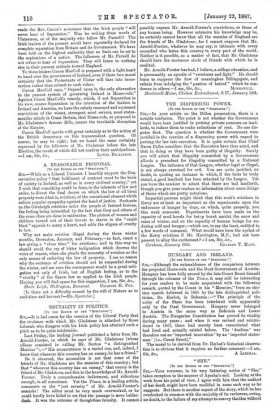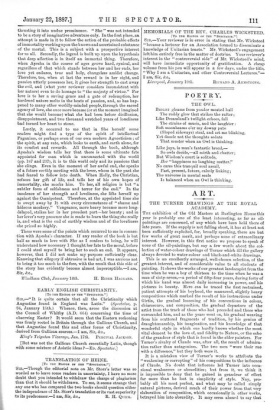"SHE."
[To THE EDITOR OF THE "SPECTATOR."] Sta,—Your reviewer, in his very flattering notice of "She," takes exception to the manner of Ayesha's end. Looking at the work from his point of view, I agree with him that the method of her death might have been modified in some each way as he suggests. But there is another aspect of the story, which he has overlooked in common with the majority of its reviewers, owing, no doubt, to the failure of my attempt to convey theidea without
thrusting it into undue prominence. " She " was not intended to be a story of imaginative adventure only. In the first place, an attempt is made in it to follow the action of the probable effects -of immortality working upon the known and ascertained substance -of the mortal. This is a subject with a prospective interest for us all. Secondly, the legend is built up upon the hypothesis that deep affection is in itself an immortal thing. Therefore, when Ayesha in the course of ages grows hard, cynical, and regardless of that which stands between her and her ends, her 4ove yet endures, true and holy, changeless amidst change. Therefore, too, when at last the reward is in her sight, and passion utterly possesses her, it gives her strength to cast away the evil, and (what yoar reviewer considers inconsistent with her nature) even to do homage to "the majesty of virtue." For love is to her a saving grace and a gate of redemption, her hardened nature melts in the heats of passion, and, as has hap- pened to many other worldly-minded people, through the sacred agency of love, she once more became (or at the moment imagined that she would become) what she had been before disillusion, disappointment, and two thousand wretched years of loneliness had turned her heart to stone.
Lastly, it occurred to me that in She herself some readers might find a type of the spirit of intellectual Paganism, or perhaps even of our own modern Agnosticism ; of the spirit, at any rate, which looks to earth, and earth alone, for its comfort and rewards. All through the book, although Ayesha's wisdom tells her that there is some ultimate fate appointed for man which is unconnected with the world (pp. 187 and 237), it is to this world only and its passions that she clings. Even in the moment of her awful end, she speaks of a future earthly meeting with the lover, whom in the past she had feared to follow into death. When Holly, the Christian, 'refuses her gift of life, and tells her of his own hopes of immortality, she mocks him. To her, all religion is but "a anbtler form of selfishness and terror for the end." In the insolence of her strength and loveliness, she lifts herself up against the Omnipotent. Therefore, at the appointed time she is swept away by It with every circumstance of "shame and hideous mockery." Vengeance, more heavy because more long- -delayed, strikes her in her proudest part—her beauty ; and in her lover's very presence she is made to learn the thing she really is, and what is the end of earthly wisdom and of the loveliness -she prized so highly.
These were some of the points which occurred to me in connec- tion with Ay esha's character. If any reader of the book is but half as much in love with She as I confess to being, he will understand how necessary I thought her fate to the moral, before I could steel myself to bring her to such an end. It appears, • however, that I did not make my purpose sufficiently clear. Knowing that allegory if obtrusive is bad art, I was anxious not to bring it too much to the fore, with the result that this side of the story has evidently become almost imperceptible.—I am, &c.,



































 Previous page
Previous page